
The Questions You’ll Get When Planning a Personal Wedding Film
(and Why They Matter)
tl;dr?
Download our film treatment to see how we plan a wedding film with personality and intention.
If you’re planning a wedding, odds are you’ve seen a lot of beautiful highlight reels. But what makes one vendor stand out from another isn’t just the music or the camera angles. The best wedding filmmakers are the ones who understand the most about their clients and their craft.
This article explores the kinds of questions great videographers ask during the planning process, why those questions matter, and what couples can ask in return. Whether you’re hiring a filmmaker for the first time or you’ve been through this process before, we hope this guide offers some clarity and peace of mind.

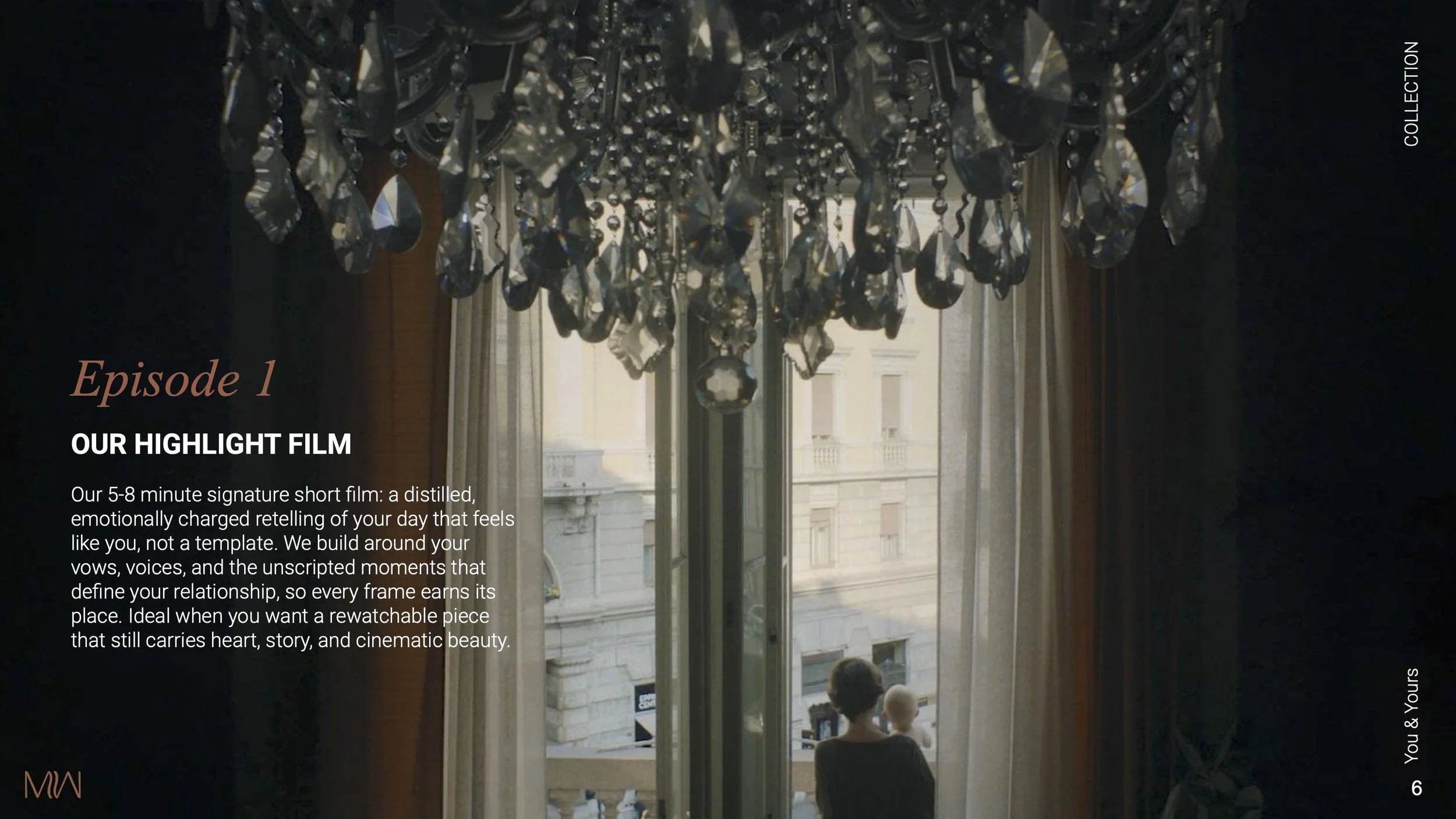
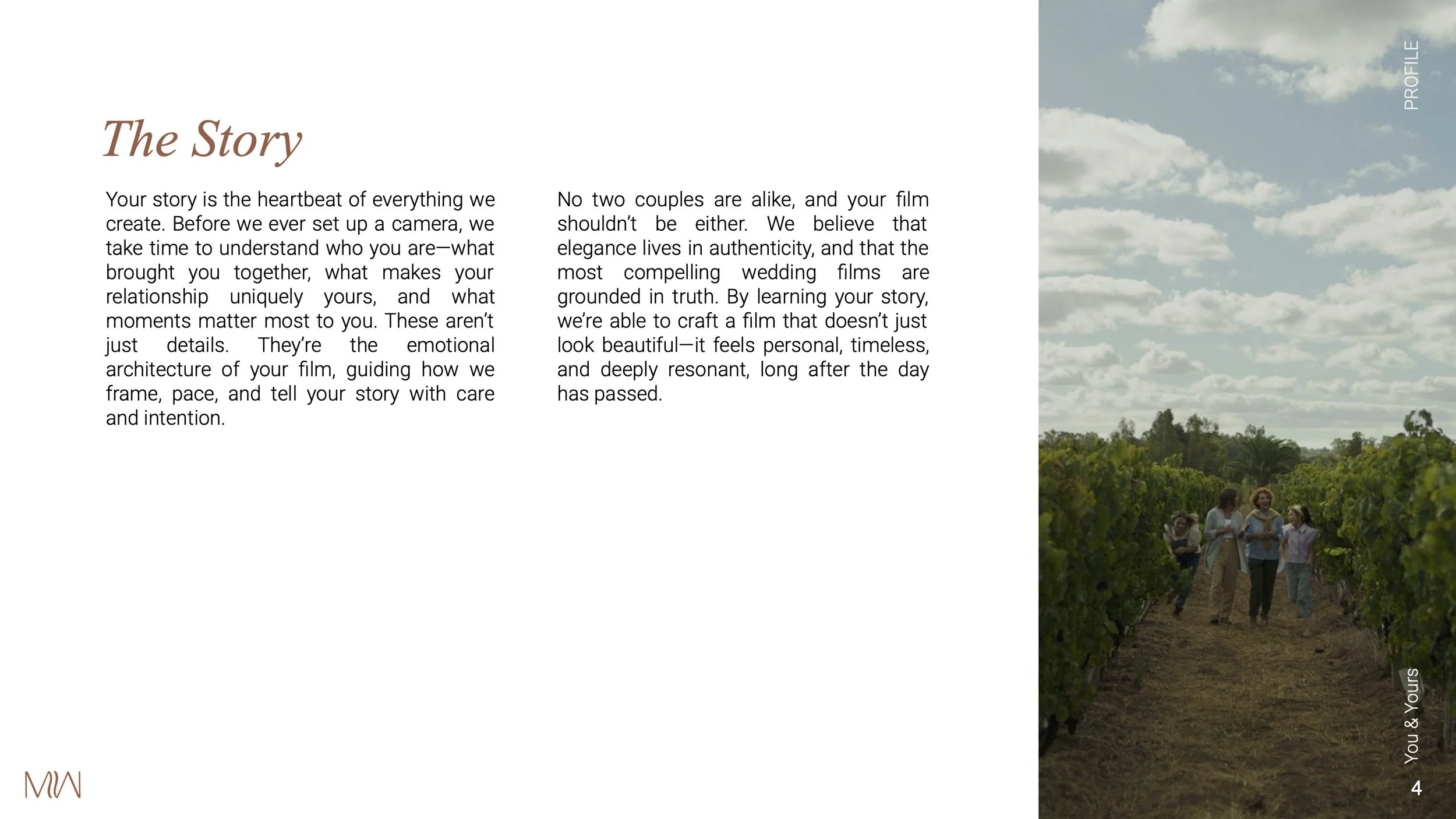
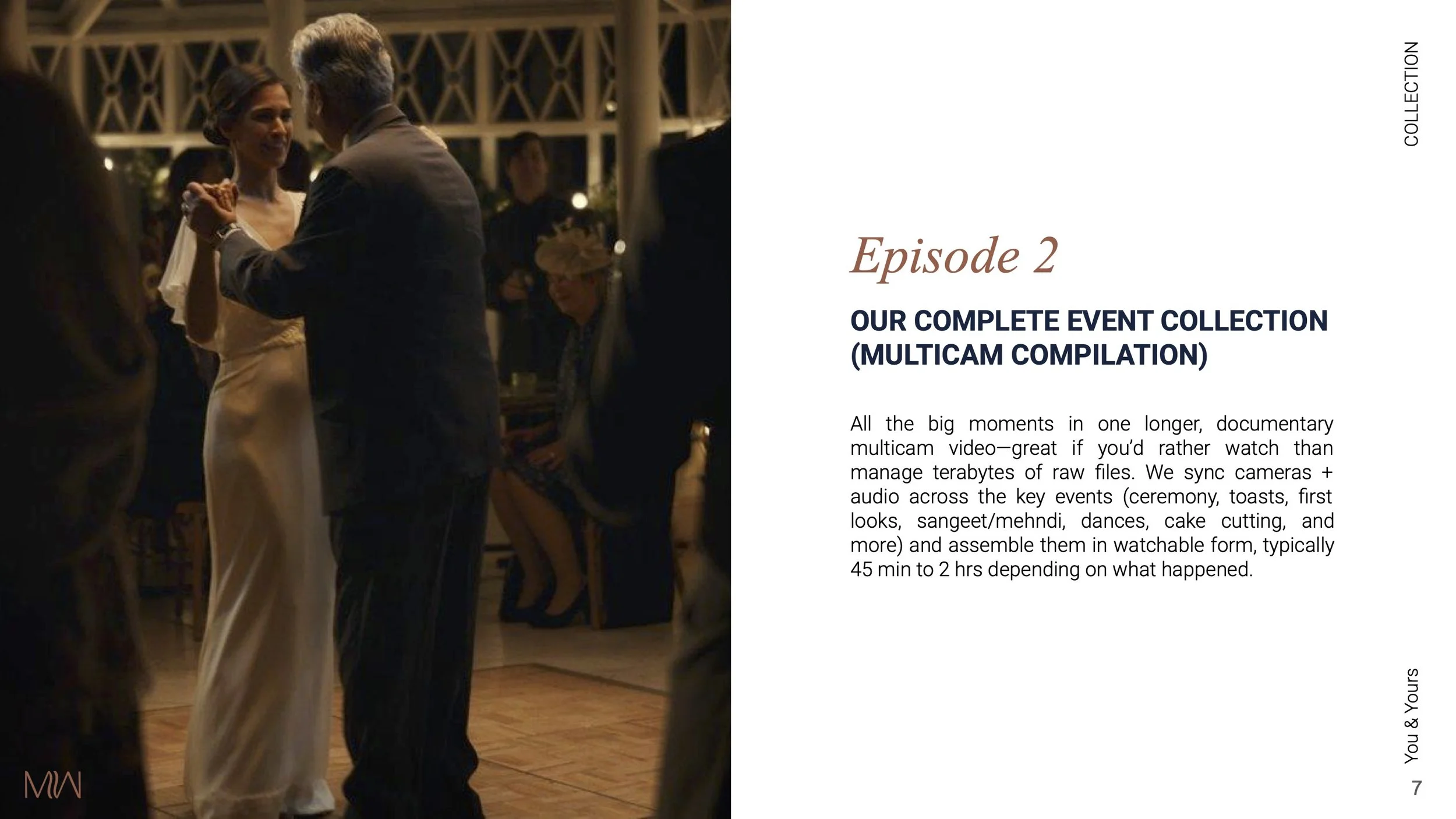
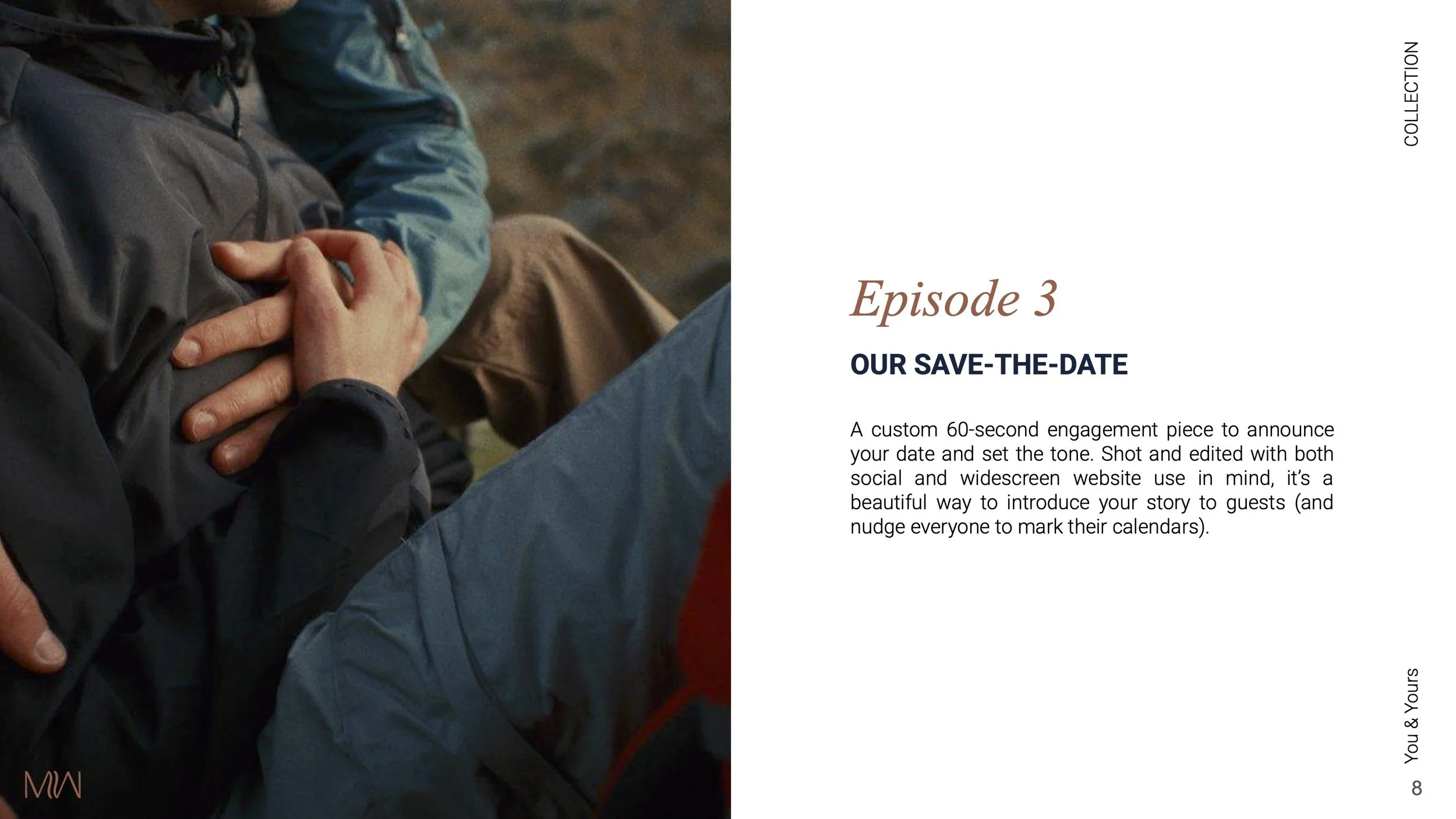
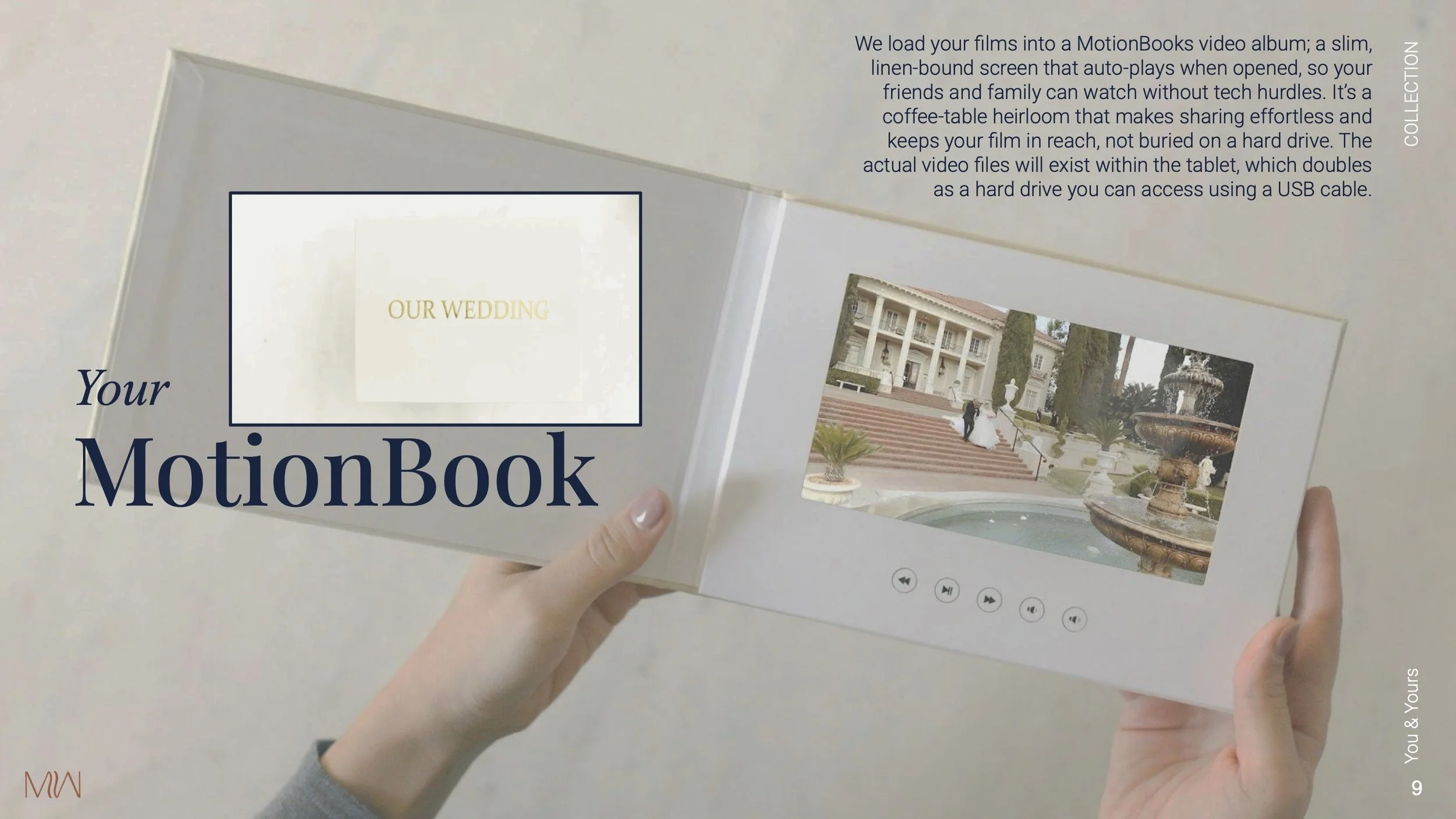
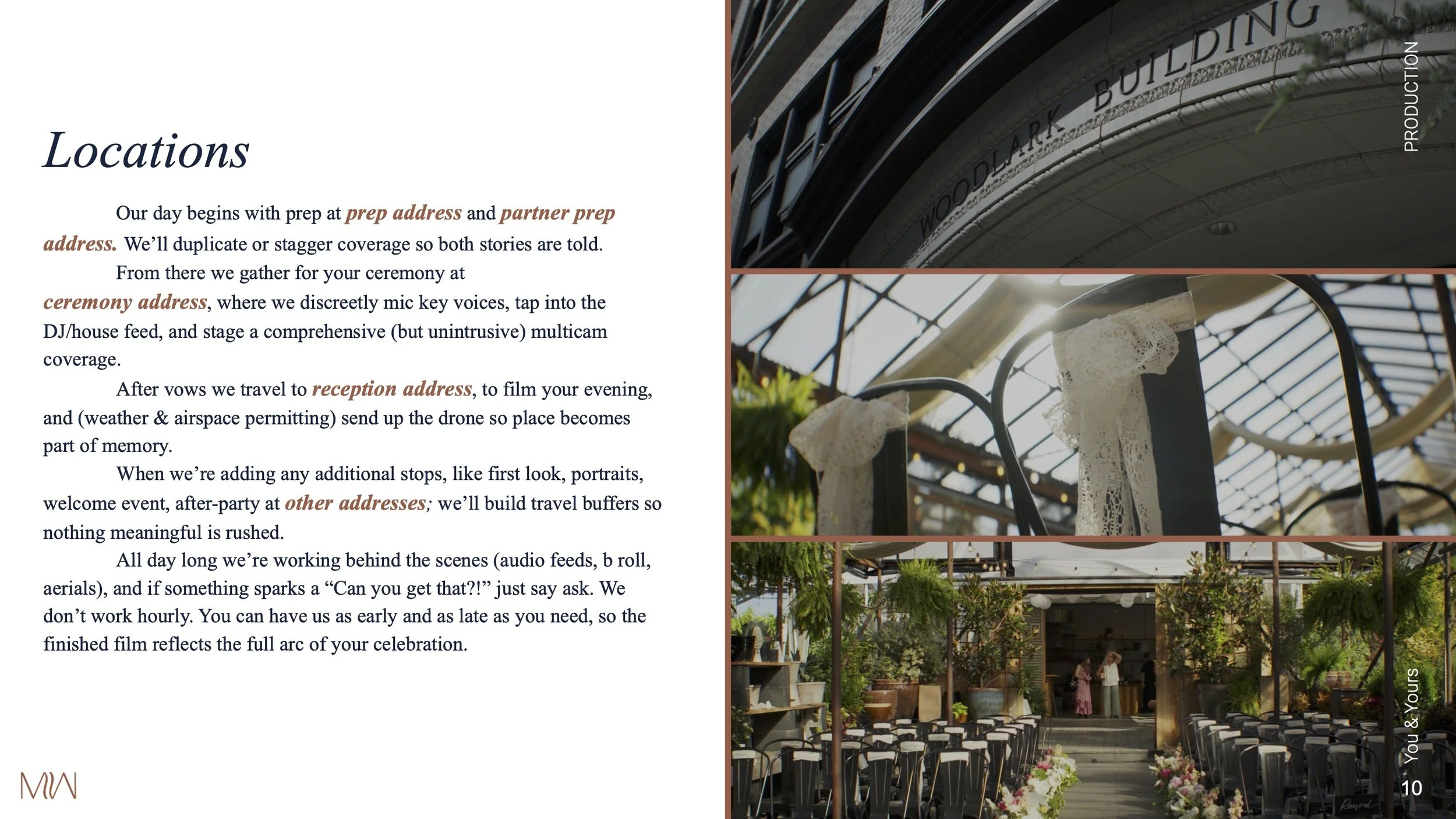
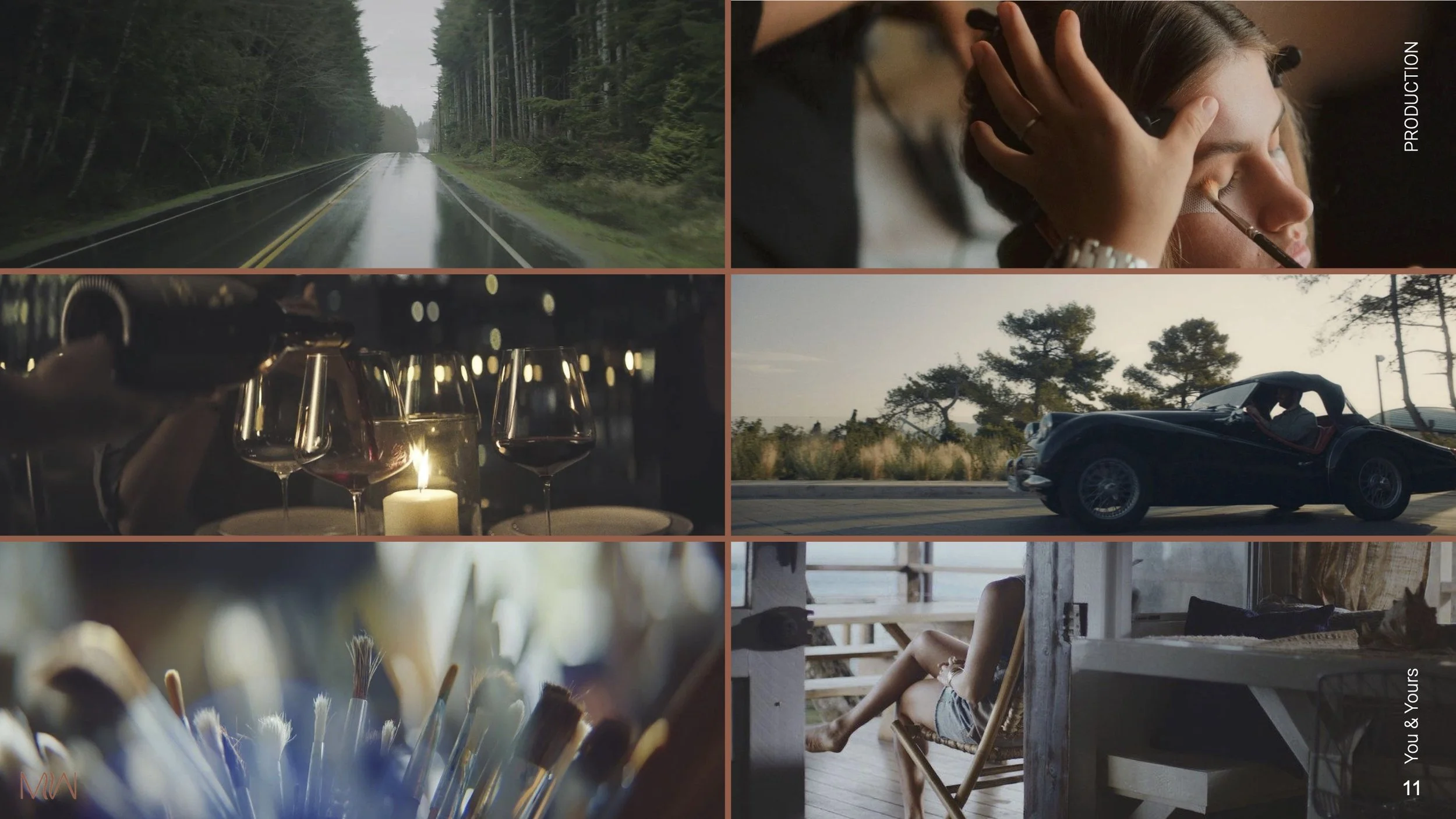

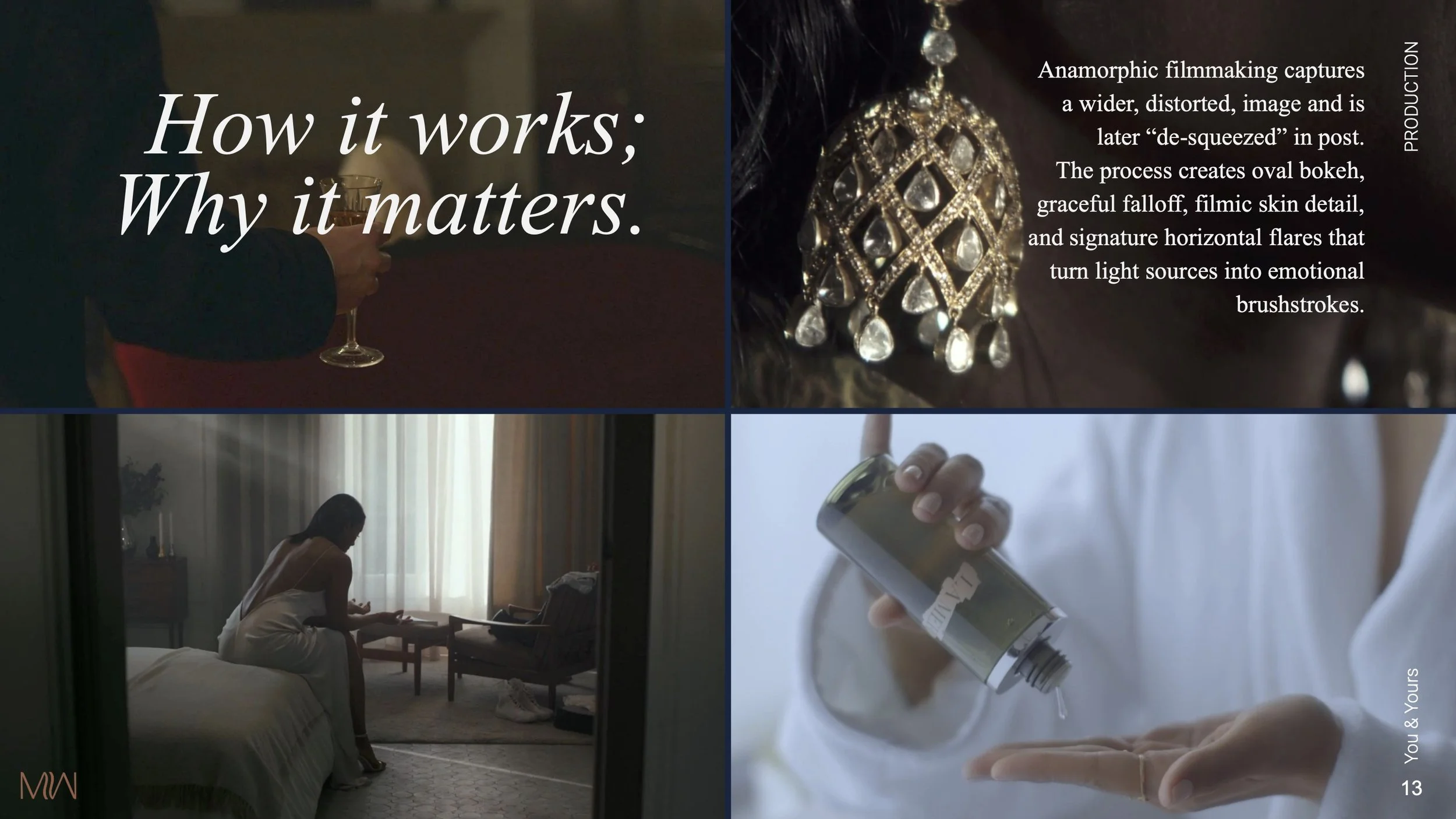
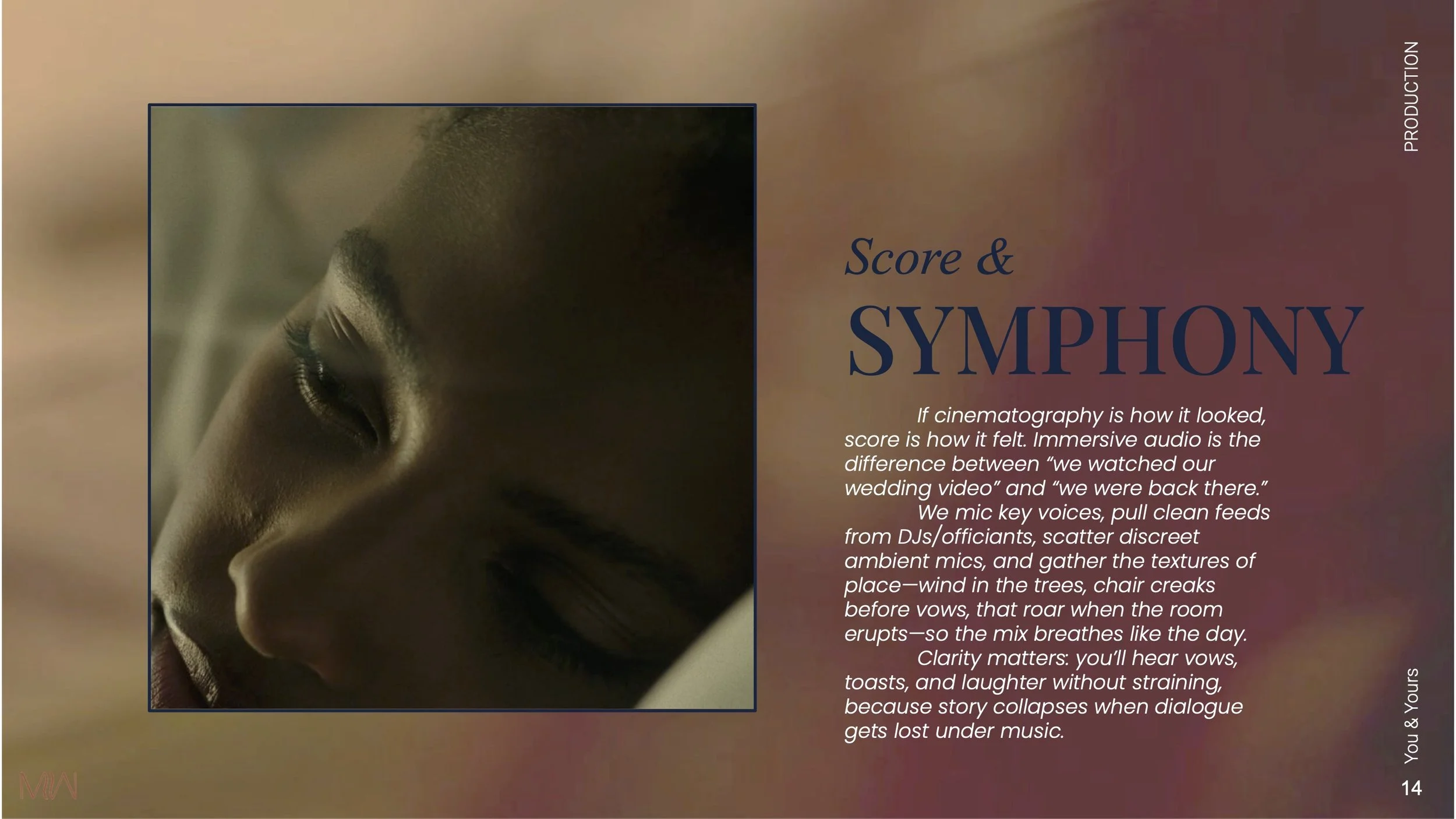
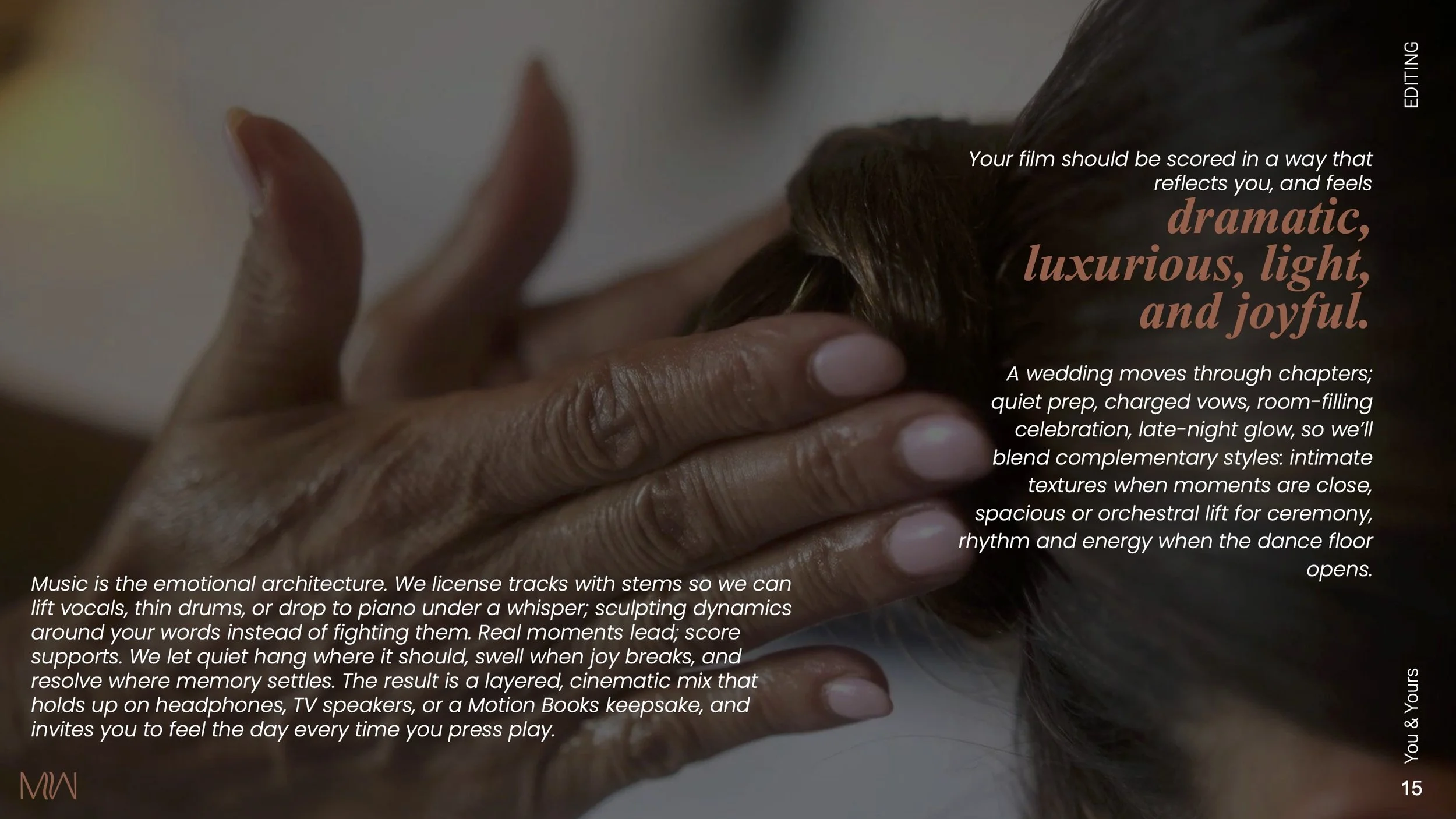
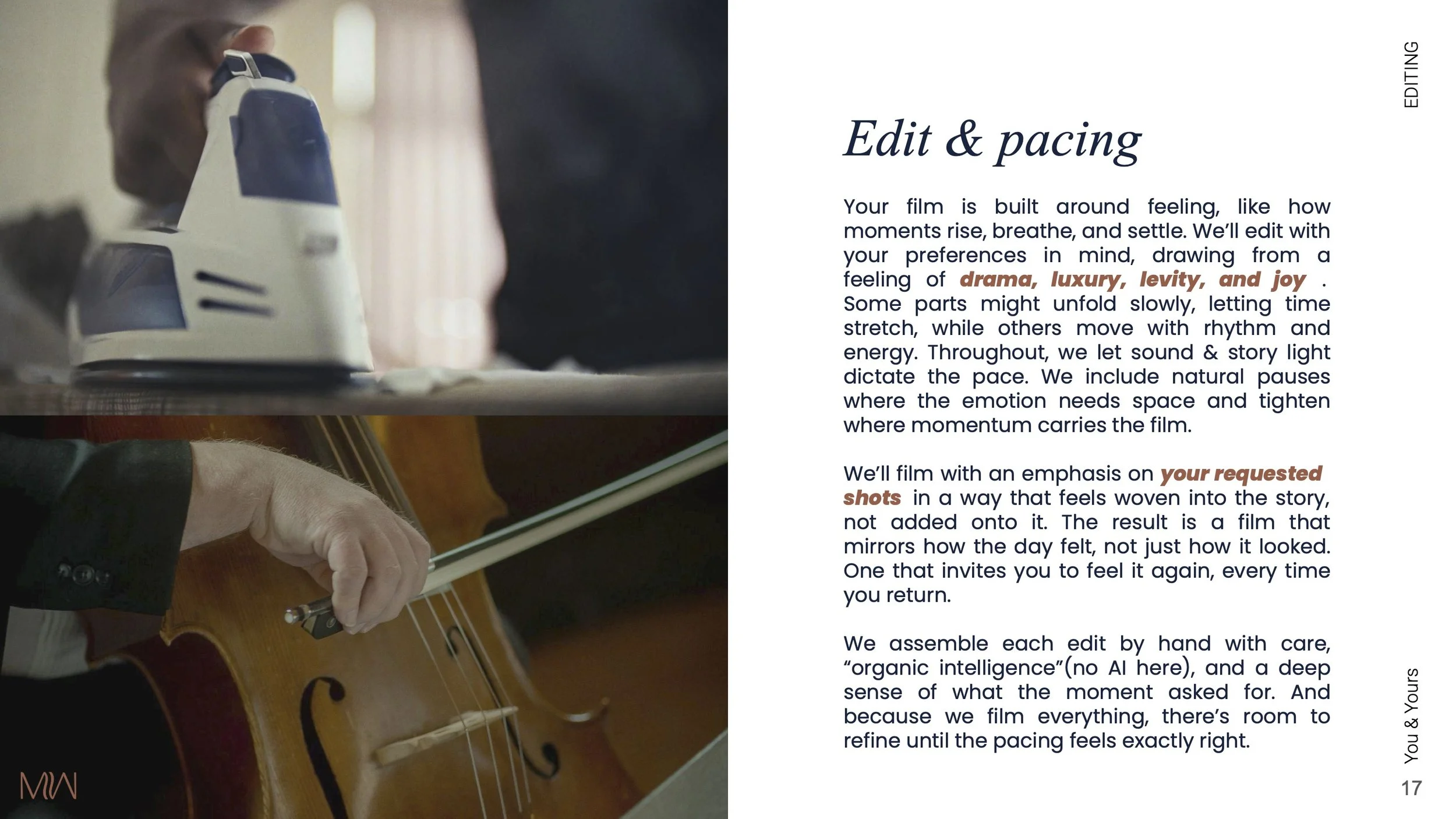
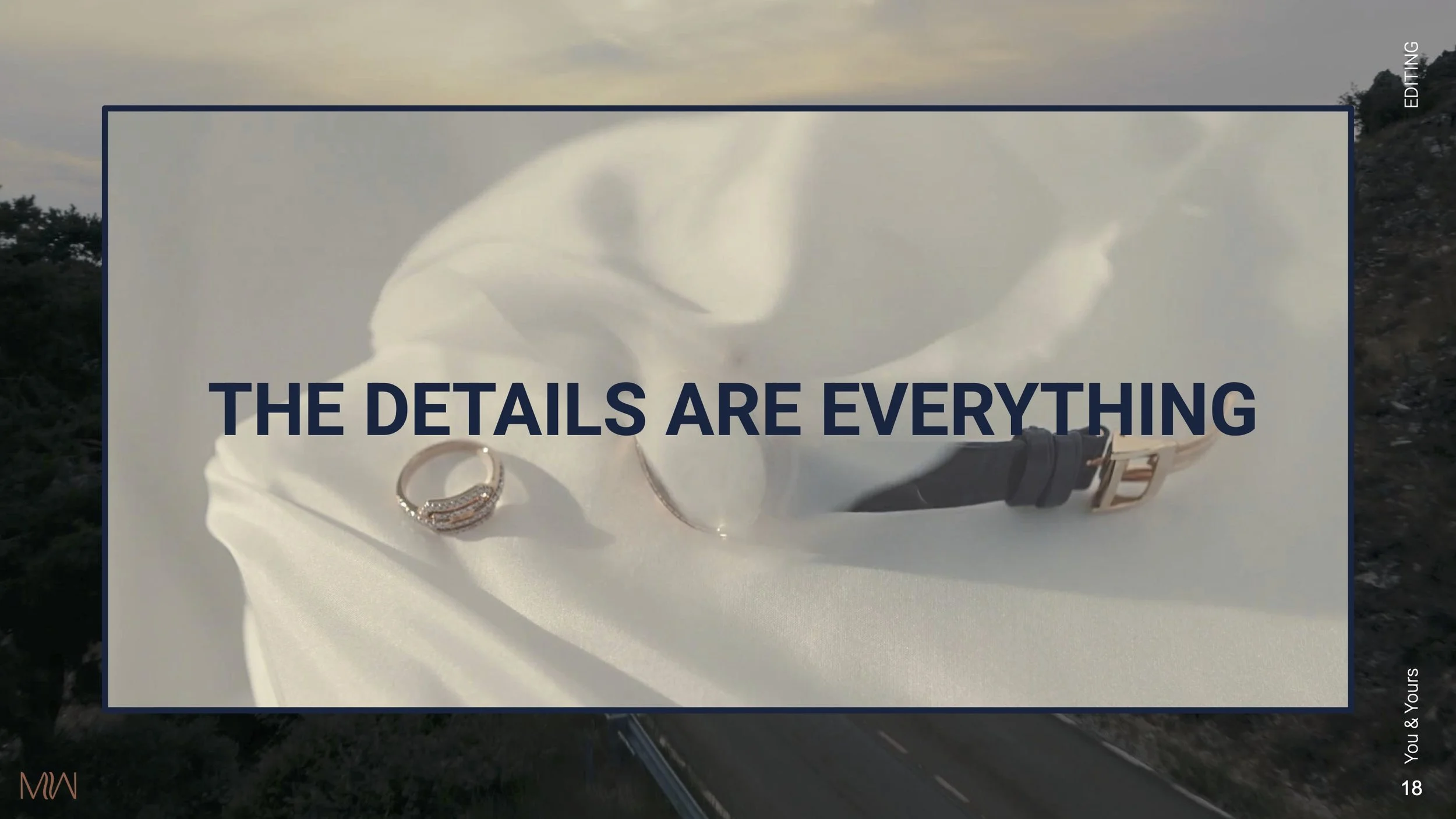
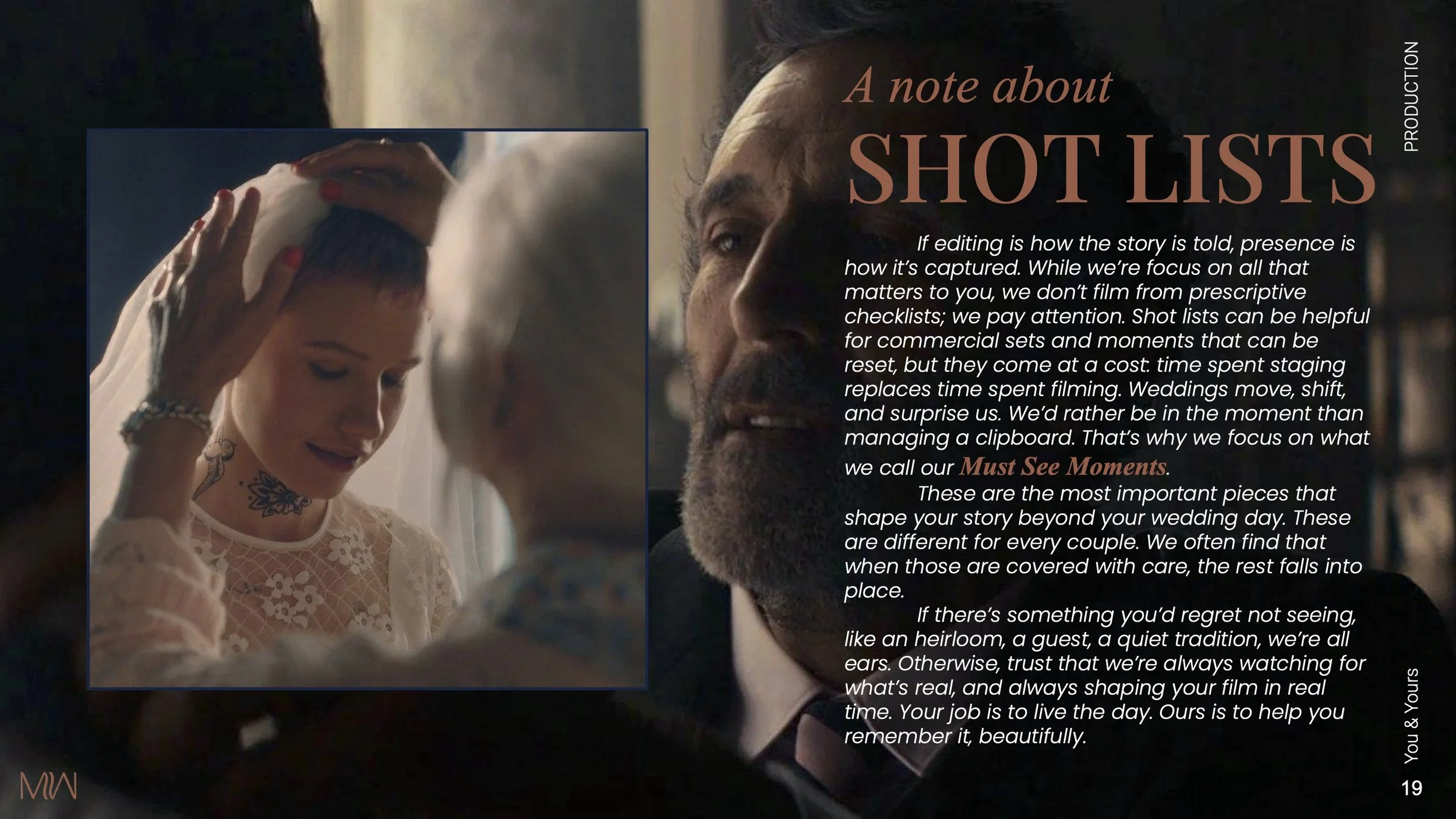


Questions You Want to Hear from Your Videographer
What stands out to you about our style?
Every filmmaker has a perspective. Some focus on high-fashion visuals, editorial poses, or stylized color grading. Others lean into a documentary approach.
Neither is inherently better. But it’s helpful to know what feels most authentic to you. If you’re drawn to raw emotion, soft light, and a sense of intimacy, you may be leaning toward documentary storytelling. If you’re looking for dramatic staging, curated moments, or flashy transitions, an editorial filmmaker might feel more aligned.
The earlier you recognize the differences in style, the easier it is to find a filmmaker whose work genuinely resonates with you.
What is your story, and what parts of it will be present on the day?
Sharing your story helps your filmmaker understand what to look for. Whether you’ve been together a decade or a year, whether your relationship is grounded in playfulness, resilience, or quiet care, those qualities shape how your day feels and how it’s filmed.
You don’t need to share everything. Even small details—how you met, why you chose your venue, what rituals matter to you—can help guide a thoughtful approach. These are clues for what to notice, what to prioritize, and how to make the film feel personal.
What types of films are you drawn to?
There’s no single definition of a wedding video. Some couples want a short, artistic highlight film. Others prioritize full documentary edits of the ceremony, speeches, or first dance. Some want it all.
Not every videographer offers the same range of deliverables, so this is a helpful conversation to have early. Think about what you want to rewatch, what you want to share with others, and what will still feel meaningful five or ten years from now.
It’s also okay if you don’t know yet. A good filmmaker will walk you through your options without overwhelming you.
What are all the locations you’ll be at on your wedding day?
Even if the final timeline isn’t locked, sharing all the places your wedding will unfold—getting ready spaces, the ceremony, the reception, and anything in between—helps your team plan for lighting, travel time, and equipment needs.
Weddings that move between multiple locations may benefit from additional crew, audio setups, or camera coverage. Knowing this in advance helps avoid last-minute stress and makes the film feels seamless from start to finish.
Location can also influence the energy of the film. A slow morning in a quiet suite feels different from a bustling house full of friends. Filmmakers use these shifts to help shape the story.
What emotional tone are you hoping for?
You may not know exactly what you want your wedding film to look like—but you probably have a sense of how you want it to feel.
Maybe it’s calm and reflective. Maybe it’s full of laughter. Maybe it’s grounded in family or spiritual meaning. These aren’t technical notes. They’re emotional cues that help your videographer choose music, pacing, and narrative structure.
You don’t need to use film terms or prepare a mood board. Just sharing a few words—intimate, joyful, timeless, grounded—can go a long way.
What are your must-see moments?
There’s a difference between making a list and naming what matters. While some shot lists can be helpful, especially when they’re emotionally meaningful, overly prescriptive checklists can work against the flow of the day.
Experienced filmmakers focus on their must-see moments rather than a shot list to anchor the story. These vary for every couple and might include a particular guest, a ritual, a piece of music, or even the energy of a place.
If there’s something that feels non-negotiable. Maybe it’s a grandparent’s reaction, a cultural tradition, or an hietloom you’ve waited to wear. These small cues help guide the edit without pulling you out of the moment.
Shot lists are great for commercial sets, where moments can be reset and restaged. Weddings move quickly. The more time spent staging, the less time spent observing. A good filmmaker knows how to balance both.
Bonus: Why Some Filmmakers Don’t Obsess Over Timelines
You’ll spend a lot of energy building your wedding timeline. It matters. But not every part of the story fits neatly into a schedule.
Some of the most beautiful moments happen in transition: a pause before walking down the aisle, an unexpected hug, a look you didn’t plan. Filmmakers who take a documentary approach allow space for those unscripted moments to breathe.
That doesn’t mean they’re unprepared. It means they’re not rigid. They’ll know where to be and when, but they’ll also be open to what unfolds naturally.

Questions to Ask Your Videographer
What if we want more than just the wedding highlight?
You might think you’ve finalized your collection, only to wish for a full toast edit or a longer version of the ceremony months later. Some videographers include raw footage. Others archive it and offer post-wedding upgrades.
Ask how long your footage will be stored, whether there’s an option to add deliverables down the line, and what that process looks like. Knowing what’s possible gives you flexibility and peace of mind.
Do you offer second shooters?
Second shooters can make a big impact, especially during multi-location weddings or moments that happen simultaneously—like getting ready in two different places. Having a second set of hands also means more creative coverage and more space to film emotional moments without disruption.
Some filmmakers include a second shooter by default. Others recommend it based on the complexity of the day. It’s okay to ask when it’s truly necessary and what value it adds to the final films.
Who will be filming our wedding?
It’s a fair question and one that often gets overlooked. Some companies send associate teams. Others are led by the same filmmaker who’s involved from the first meeting to the final edit.
Neither approach is wrong, but clarity matters. Ask who you’ll be speaking to, who will be on-site, and who is responsible for crafting the story afterward. The more familiar you are with your team, the more at ease you’ll feel on the day.
How does your gear support the story?
Not everyone wants to talk about cameras and audio gear, but there’s real value in understanding how tools affect the outcome. Some filmmakers use cinema-grade cameras or specialty lenses that give the film a more timeless feel. Others prioritize discreet setups to stay out of the way.
Audio is just as important. Good sound design doesn’t just capture words—it captures space, mood, and presence. If hearing your vows clearly or preserving the atmosphere of a toast matters to you, ask how those moments are recorded.
These questions aren’t about gear for gear’s sake. They’re about knowing your story will be told with clarity and care.
Will I see a Film Treatment or Mood Board?
A film treatment is like a creative blueprint. It outlines how your videographer thinks about storytelling, visuals, audio, pacing, and presence. Some filmmakers share their treatment as a planning tool to help couples understand what to expect.
It’s not a sales document. It’s a way to build shared language. Reading a treatment can help you decide whether a filmmaker’s approach aligns with your values and preferences.
If you want to get a clearer picture of how we approach filming and editing, you can download our treatment here. It’s meant to be helpful, not persuasive.

Final Thoughts
Your wedding film isn’t just about the day. It’s about what you’ll remember years from now. Asking the right questions is part of building something that feels lasting, honest, and uniquely yours.
The best films aren’t just beautiful. They’re intentional. They reflect not just what happened, but what mattered.
HOw to book:
Check our availability
Our team covers a limited number of events every year, but if your date isn’t available, shoot us a message, and we can “check the back” or put you in touch with some other fantastic, trusted filmmakers in our network.
2. Choose a Collection
Select the film duration that best captures your vision. We have options from a concise highlight to an extensive documentary. Then, customize with Companion Films to ensure every cherished moment is preserved.
3. Reserve Your Spot
During reservation, a 50% deposit rate is automatically applied to your total. Checking out blocks your date in our calendar.
We’ll follow up with a straightforward contract to finalize the details. Prefer to discuss first?
Schedule a consultation to explore your options.
If, for some reason, we aren’t the right fit, a full refund can be issued immediately.










